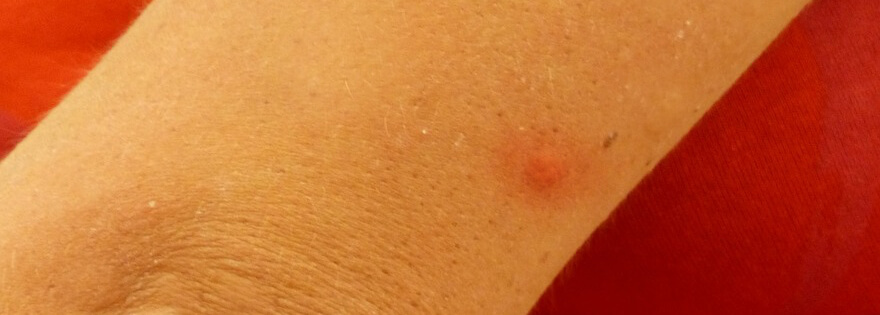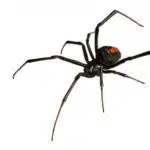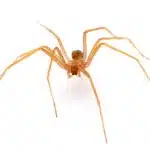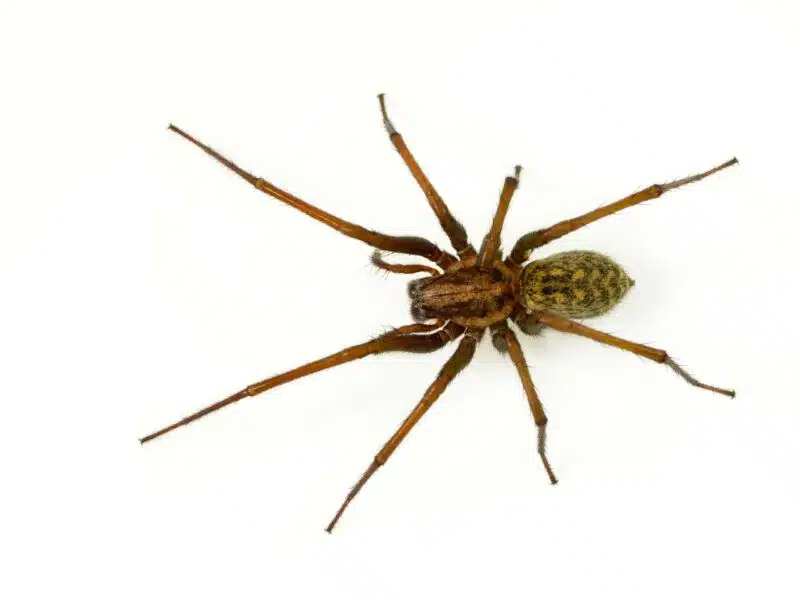Do House Spiders Bite? Identification, Symptoms & Treatment
By: EarthKind
Yes, many types of spiders do have the ability to bite humans. Many bites will cause minor irritation, but in some cases, they can lead to severe pain and reaction.
How many times have you noticed a red bump on your skin and assumed it was a spider bite without knowing where it came from?
Almost every home has these creepy-crawly pests, and most human-spider contact happens at home with a house spider. That being said, their bites are not as common as you may think, and they are often harmless. While these pests have venom to subdue their prey, their prey is usually much smaller than people so bites often have little to no effect on us. For most spider species, people are simply too large to be seriously affected. According to the Burke Museum, there are about 50,000 different species of spiders, and of those, only 25 have venom that may cause illness to humans.
That means bites from some types of venomous spiders can be dangerous because they have large enough fangs that can penetrate human skin, but most common house spider bites won’t cause much reaction. This is why it’s important to learn how to identify a spider bite, the symptoms you should look for, and how to quickly treat them at home if medical attention is not needed.
How to Identify Common Spider Bites
The most obvious signs of a spider bite include (but are not limited to):
- Itching
- Swelling
- Raised red bump at the bite area
- Redness or irritation
- Two holes in the middle of the bump
The signs are often very similar to those of other insect bites or skin irritations, if not severe. If you have noticed an abundance of these pests in your living environment, you might be quick to assume the cause of any skin irritation is caused by a spider.
Keep your home pest free with simple, effective solutions. Subscribe and save!
They are often blamed for mysterious red bumps or itchy spots on a person’s body, but they don’t bite people as often as you may think. When they do, it usually goes unnoticed until after the fact. Identifying a bite from a spider is easiest if you see it happen. If you don’t see it happen, then it could very well be a bee sting, mosquito bite, or irritation caused by a different insect.
Knowing which common house spiders are dangerous will spare you from some stress and worry. If you spot one in your home and notice skin irritation, it’s possible you should get it checked out if you are experiencing aligning symptoms.
Species to Avoid
As previously mentioned, most spiders are harmless. However, there are some that can have dangerous bites, leading to severe symptoms and reactions. Most of the time they will only bite out of fear when they feel threatened. These are the species that could be dangerous:
- Black Widow Spider – This type is shiny black with a red hourglass shape on its belly. Its venom is considered a neurotoxin.
- Brown Recluse Spider – This type is usually a lighter shade of brown and sometimes will have a violin-shaped marking on its back. Their venom typically affects the blood cells around the site, leading to necrosis.
The following spiders have venom that is not a major threat to humans. Their bites can cause mild discomfort but rarely result in serious reactions:
- Hobo Spider – This is a large, brown spider most often found on the west coast of the US. It is known to have yellow markings on its abdomen.
- Tarantula – They are large, hairy spiders known for their imposing appearance and general docile nature unless provoked.
- Wolf Spider – They have robust bodies, hairy exteriors, and typically brown or gray coloration. They exhibit hunting behavior rather than web-spinning.
Spider Bite Symptoms
The species above have fangs that can penetrate the skin. If you think you’ve been bitten by one of these, here are some symptoms to look for:
- Fever
- Body aches or headaches
- Stomach pain, sometimes accompanied by nausea and vomiting
- Chills
- Sweating
- Muscle cramps, spasms, or pain
- Increased heart rate
- Difficulty breathing
- Increased blood pressure
- Intense pain at the bite site
- Skin lesion
Seek medical attention right away if you believe you’ve been bitten by a dangerous spider or if you are experiencing any of the symptoms above or skin infection at the bite area. If you believe you’re having some sort of allergic reaction to a house spider bite, this is also a sign to visit a doctor. While they’re rarely life-threatening, it’s best to get it checked out rather than waiting to see what happens.
How to Treat
Please keep in mind that we are not medical experts. Additional medical resources are available online, so use these helpful first-aid tips at your discretion.
If you are experiencing mild symptoms or skin irritation following a spider bite, many at-home treatments may bring you relief.
- Start by cleaning the affected area with soap and water
- Use an ice pack or a cool compress to relieve inflammation
- If possible, elevate the area to reduce swelling
- Try an oral or topical antihistamine to combat itching
- If a blister appears, antibiotic ointment may help
- Seek medical care if local or systemic symptoms continue
It’s also worth mentioning that the Centers for Disease Control and Prevention (CDC) recommends keeping your tetanus boosters up-to-date (every 10 years) as spider bites can become infected with tetanus spores.
If you’re looking for natural home remedies to help relieve bug bites, we have some that could help. You can use items such as basil leaves, peppermint, and cucumbers to help reduce the swelling and inflammation. If you’re looking to stop the constant itching, aloe vera can help, and it’s good for your skin!
How Long Will a Bite Last?
A bite may go unnoticed at first, but eventually, the itchy red bump becomes hard to ignore. The sooner you treat a bite, the sooner it will disappear. Harmless spider bites will usually clear up in a few days. Avoid scratching as it may break the skin, increasing the risk of secondary infection and taking longer to heal.
Effects of a dangerous spider bite are typically noticed sooner and may last longer; discoloration around the bite mark may begin, appearing within 15 minutes, and healing can take up to 10 days for some people.
Prevent These Pests in Your Home
While some spiders can be dangerous, most are actually beneficial and will help with other types of insect and pest control. Maintaining a pest-free home will lower the odds of getting bit inside your house.
Being proactive about preventing these pests from entering your home is a reliable way to help avoid this issue. Frequent cleaning to reduce clutter (especially in the places they tend to hide, like basements and closets) and dusting to remove cobwebs is the first line of defense to help get rid of spiders. Remember to shake out clothes and other stored items in attics and garages before moving them indoors.
Lastly, use a botanical spider deterrent like Stay Away® Spiders to discourage these pests from taking shelter in your home! Buy online or in-store.











 day
day